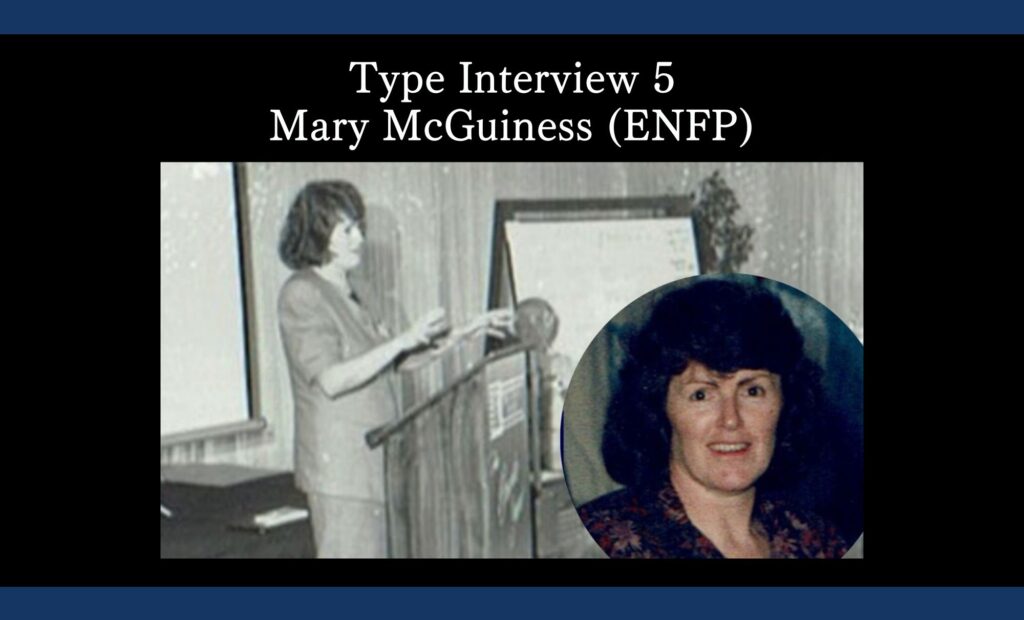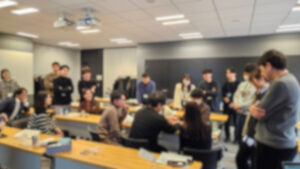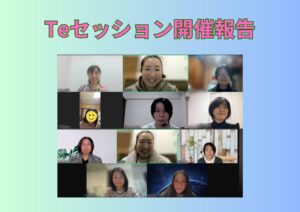
はるみ: ENFPのベテランタイプトレーナーとして、タイプの世界に足を踏み入れたばかりのENFPにどのようなアドバイスをしますか?
メアリー: もしタイプに関する仕事をしたいのであれば、きちんとしたトレーニングを受けることですね。そして、何をするにしても、しっかりとやること。
世の中には、手を抜いたり、簡単に済ませたりする人が本当に多いと思います。短期間で、手軽に終わらせようとする人も多いです。
でも、しっかりとした仕事をすれば、人々はそれを評価し、価値を感じてくれます。そして、あなたを推薦してくれるようになります。
私はこのビジネスを始めて最初の20年間、一切広告を出しませんでした。
すべて口コミだけでした。
最終的には、毎年20の認定プログラムを運営するまでになりました。
1つのプログラムには少なくとも20人、多い時には35人が参加していました。
もう一つ、ENFPにアドバイスしたいのは、財務管理に気をつけることです。
ENFPは、つい他の誰かにお金の管理を任せてしまいがちです。
その結果、使いすぎてしまったり、マーケティングを忘れてしまったりすることがあります。なぜなら、私たちはもともと整理整頓が得意ではないからです。
はるみ: タイプについて、誰から学びましたか?
メアリー: 2人の重要な先生がいました。ノエル・デイビス と マーガレット・ハーツラー です。

右:ノエル・デイビス
私の最初のタイプの先生の一人は、INFJのノエルでした。彼はオーストラリア出身で、数年前に亡くなりました。
ノエルは「マリスト・ブラザーズ」というカトリックの修道会に所属していました。
1960年代、70年代、80年代のオーストラリアでは、多くのカトリック教会の修道士、司祭、修道女たちが学校で教えていましたが、彼らは教育大学で1年間しか学んでいないことも珍しくありませんでした。
そこでカトリック教会は、自分たちの教師を海外へ派遣し、大学院レベルの教育を受けさせることを決めました。
多くの教師がカリフォルニア大学バークレー校やシカゴのロヨラ大学に留学しました。
海外で彼らはマイヤーズ=ブリッグス・タイプ指標(MBTI)に出会いました。
特にバークレーではデイヴィッド・ケルシーが気質理論(Temperament Theory)を教えていたこともあり、MBTIが広まりました。
その結果、多くの教師たちはMBTIの質問紙や関連資料を持ち帰り、自分たちのコミュニティや学校でタイプ論を教え始めました。
これがオーストラリアでタイプ論が広まったきっかけです。
ノエルもカリフォルニア大学バークレー校に留学し、当時は公式な認定プログラムはなかったものの、MBTIの質問紙を購入することを許可されました。
彼はタイプ指標(MBTI)を使いながらワークショップを開催し、ユングの『心理学的タイプ』の詳細な知識を取り入れていました。
ノエルは常に学び続け、各認知機能について非常に深い理解を持っており、他の誰よりも早い時期にこれを教えていました。
はるみ: 修道士になった人々には、特定のタイプの傾向がありましたか?
メアリー: どんなタイプの人もいましたが、特にセンサータイプ(S)や、SJ・SFJタイプの割合が多かったです。
第二バチカン公会議(Vatican II)では、教会の近代化が進められ、その一環として教育の充実も図られました。
その結果、多くの修道士や修道女が宗教的な生活を離れ、一般社会に出るようになりました。
こうした人々の中には、MBTIを学び、ビジネスの世界に進んだ者も多くいました。
私自身もタイプ論を教えてしばらくした後、2週間のリトリート(修道士向けの研修)に参加する機会を得ました。
そのうちの3日間はタイプ論の授業がありましたが、私はその内容にすっかり魅了されました。

私はノエルたちが開催していたいくつかの講座に通い始めました。
そして1985年のある講座で、アメリカのType Reporterという雑誌を手に取りました。
そこに、マイヤーズ=ブリッグス・タイプ指標(MBTI)を使うための認定プログラムに関する小さな広告が載っていました。
これが、私にタイプを教えてくれたもう一人の人物、マーガレット・ハーツラー(ENFJ)との出会いのきっかけでした。
彼女とキャサリン・マイヤーズは、ちょうどこの認定プログラムを始めたばかりでした。
それまで、MBTIの認定プログラムは存在しておらず、指標を購入できるのは心理学者だけでした。
しかし彼女たちは、心理学者以外の人々にもトレーニングを受けさせ、指標を使えるようにするために、このプログラムを始めたのです。
私は興味を持ちましたが、アメリカまで行って受講することは考えていませんでした。そこで、メールもなかった時代に、彼女たちに手紙を書いたのです。
すると2週間後、マーガレットの夫ゲイリー・ハーツラー(ENTP)から電話がかかってきました。
彼はこう言いました。
「こちらに来なくていいよ。我々はまだオーストラリアに行ったことがないんだ。ぜひ行ってみたい。」
そこで、私は1年かけて受講希望者を集め、最終的に45人の受講生が集まりました。
この講座のことを知った人たちは「ぜひ受講させてほしい」と次々に申し込んできました。
その中には、すでにMBTIを使っていたカトリックの修道士たちも多くいましたが、正式なトレーニングを受けたことはありませんでした。
最終的に、マーガレット・ハーツラー、ゲイリー・ハーツラー(ENTP)、キャサリン・マイヤーズ(INFP)がオーストラリアに来ました。
キャサリンはMBTIの創始者であるイザベル・ブリッグス・マイヤーズの義理の娘です。
マーガレットは、その後20年間、毎年オーストラリアを訪れるようになりました。
私たちは、講義だけでなく、昼食や夕食の時間もずっとタイプの話をしていました。
素晴らしい講座になり、講座終了後も1週間ほど彼らと一緒に過ごしました。
その時、ハーツラー夫妻が言いました。
「すごくうまくいったね。またやらない?」
こうして、すべてが始まったのです。
私はもともとビジネスを始めるつもりは全くありませんでした。
当時は学校の先生をしていて、その仕事に満足していました。
でも、「またやってみない?」と言われ、1986年1月に再び開催しました。
そして、8月にまた新しいコースを発表し、それから毎年1〜2回開催するようになり、徐々に回数を増やしていきました。
ビジネスプランもなければ、事業を立ち上げる意図もなかったのです。
その後、マーガレットは時々リンダ・ベーレンズと一緒に仕事をしていたため、リンダもオーストラリアに来ることがありました。
ノエルが講義をする時には、マーガレットやリンダもクラスの後ろに座り、彼の話をメモしていました。
ノエルの講義はとても素晴らしく、徹底的に詳しかったのです。
そして、その内容がアメリカのMBTI認定プログラムに取り入れられ、8つの認知機能の概念が正式に導入されました。
こうして、ノエルはアメリカとオーストラリアのタイプトレーニングに大きな影響を与えました。
彼自身はアメリカへ行ったことはなかったにもかかわらず、です。
マーガレット・ハーツラー(ENFJ)は、私と同じく元教師でした。
彼女の影響力は大きく、ただタイプを教えるだけではなく、「本当に理解できるまで指導する」姿勢があったのです。
はるみ: タイプに最も惹かれた理由は何ですか?
家族を理解するのに役立ったことです。私は14ヶ月年下の妹がいて、後に彼女がISTPだと知りました。
さらに、その妹より14ヶ月年下のもう一人の妹がいて、彼女はISFPでした。
私たちは年齢がとても近かったのですが、その二人はいつも一緒に何かをしていて、私はいつも仲間外れのように感じていました。
でも、パーソナリティタイプを学んだことで、すべてが突然納得できるようになりました。
もう一つは、兄のことです。兄のことを、他の兄弟姉妹は「ちょっと変わっている」と思っていました。でも、彼がINTPだとわかったんです。
私は11人の兄弟姉妹がいるのですが、そのほとんどがセンサータイプです。
私たちの中で直感タイプだったのは4人だけで、INFP、ENFP(私)、INTP、そしてINTJでした。
でも、他の兄弟姉妹はみんなセンサータイプで、SPやSJばかりでした。
そのため、彼らは兄のことを「変わっている」と感じていました。
でも、彼と最も仲が良かったのは私(ENFP)と、彼より12歳年下の弟(INFP)でした。私たちは全員、外向的直感(Ne)を持っていたからです。
はるみ: ご両親のタイプは何だったと思いますか?
メアリー: 母は私と同じENFPだったかもしれません。実は、母は私がタイプの勉強を始めるちょうど1年前に亡くなりました。
きっと、彼女とイザベル・マイヤーズが天国で何かを企んでいたんじゃないかと思います。
というのも、イザベル・マイヤーズもその数週間後に亡くなっているんです。
でも、母はきっとこの分野が大好きだったと思います。
彼女はあらゆる自己啓発に興味を持っていて、私にもよく「積極思考の力」や「人を動かす」といった本を勧めてくれました。
父はESTJだったと思います。
はるみ: タイプを教える中で、特に印象的な喜びの瞬間は何でしたか?
メアリー: 私は入門ワークショップが好きです。なぜなら、参加者が自分のタイプを発見し、それにワクワクする姿を見るのが楽しいからです。
30年前、ある女性が参加した週末のワークショップのことを覚えています。
地域の小さなコミュニティ向けのワークショップで、終盤に差し掛かり、参加者が自分のタイプを特定し、タイプの説明を読んでいるときでした。
ふと、部屋の後ろを見たら、一人の女性が涙を流していました。
私は彼女のところへ行き、「大丈夫ですか?」と尋ねました。
すると彼女は「ええ、大丈夫です。でも、今、なぜ母とうまくいかなかったのかがわかったんです」と言いました。
彼女にとって、それは突然の大きな気づきでした。少し話をしましたが、このような体験をする人は本当に多いです。
自分自身や、誰か大切な人について、深く理解できる瞬間というのはとても価値のあるものです。
多くの人が、親と違うタイプだと「自分には何か問題があるのでは?」と感じながら育ちます。
私自身も、自分の子どもにタイプの知識がとても役立ちました。息子はESFPです。
ESFPは、気をつけないとトラブルに巻き込まれやすいタイプです。
でも、彼が生まれる前から私はタイプを理解していたので、彼が3歳になる頃にはすでに彼のタイプがわかっていました。
そこで、私は彼にたくさんの身体を動かす機会や、音楽、スポーツを楽しめる環境を作りました。
でも、自由の中にもルールを設定しました。私は彼に、一定のルールを守ることや責任を持つことを期待しました。
その上で、できる限り自由を与えました。
結果として、彼は問題を起こすことなく思春期を過ごしました。
私は、息子が思春期の間、一度も悩まされることがありませんでした。本当に、一日もありませんでした。
SPタイプの子どもは、何か欲しいものがあると強く押してきます。
息子が3歳のときのことを覚えています。
牛乳とパンを買いにちょっとお店に立ち寄ったとき、彼が欲しいものを見つけたんです。
そして、店内を回る間ずっと、「これ買って」とねだってきました。私は「今日はおもちゃは買わないよ」と何度も言いました。
レジに着いたとき、彼は本当に必死になっていました。
そして私を見てこう言いました。
「ママ、これ買ってくれないなら、もうママのこと好きじゃないよ。」
そのとき私は彼を見て、「なんて賢い子なの」と思いました。
ENFPにとって、一番辛いことは自分の子どもに愛されないことです。彼はそれをわかっていました。
そこで私は彼にこう言いました。
「ダミアン、あなたはママのことを愛さずにはいられないのよ。だって、ママなんだから。」
彼はじっと私を見つめました。
そして、それ以来二度と同じ手は使いませんでした。
ある晩、教会に行きました。
特別なイベントがあったのです。そのとき彼は5歳か6歳でした。教会を出るとき、彼の父親(ENFJ)がこう言いました。
「ダミアン、今夜はとてもお行儀がよかったね。」
すると息子は父を見て言いました。
「パパ、どうして僕が今夜お行儀よくしてたか、わかる?」
「ううん、どうして?」
「だって、ママがいたから。」
つまり、彼は私が言ったことは本気だとわかっていたのです。
彼の父親はENFJで、いつも周りと平和を保ちたがるタイプでした。
でも私にとっては、これは価値観の問題でした。
私は息子に、欲しいものがあるたびに駄々をこねるようになってほしくなかったのです。
3歳の子どもが駄々をこねるのは可愛いかもしれません。
でも13歳になっても同じことをしていたら、もう可愛くありません。
だから私は、彼に期待する行動と価値観をしっかりと伝えました。その中で、できるだけ自由も与えました。
だから、私が言ったことは、本気だと彼は理解していました。
彼が5歳か6歳のとき、幼児向けの音楽教室に通っていました。
その後、ピアノを始めることになりました。そのとき私は最初にこう言いました。
「ピアノをやるなら、最低でも1年間は続けること。」
なぜなら、Pタイプがどんなものか知っているからです。
興味を引かれるものが変わると、すぐに別のことに移ってしまうことがあります。
ある金曜日の午後、ピアノのレッスンの時間になりました。息子は車に乗るなり言いました。
「ママ、パパと話したんだけどね、僕、もうピアノやめるよ。」
私は「ダミアン、約束したよね。最低1年は続けるって。」と言いました。
すると彼は言いました。
「でもね、ピアノの時間、パワーレンジャーがやってる時間なんだよ!」
彼は車の中で小さな駄々をこね始めました。
私は「どうしよう」と思いました。無理やりレッスンに連れて行くのは避けたかったのです。
そのとき、以前エヴ・デ・ルナスの「Survival Games Personalities Play(パーソナリティが繰り広げる生存ゲーム)」というワークショップに参加したことを思い出しました。
SPタイプの子どもは、欲しいものを手に入れるために駄々をこねる傾向があると学んでいました。
そこで私は「よし、彼女が言っていた通りにやってみよう」と思いました。
冷静に対応し、選択肢を与えること。そして、その選択肢を厳格に適用すること。
一度選択したら、それで決まり。
私はとても冷静に座ったまま、こう言いました。
「ダミアン、もしピアノのレッスンに行かないなら、テレビを売るよ。」
彼はじっとフロントガラスを見つめていました。
30秒ほど沈黙した後、彼は私の方を向いて言いました。
「わかった、行くよ。」
それはただの演技でした。本当にそれだけのことでした。
そこで私は彼にこう言いました。
「じゃあ、こうしよう。番組を録画しておくから、レッスンから帰ったら見られるよ。」
はるみ: タイプに関する歴史の中で、印象的な対立や衝突はありましたか?
メアリー: オーストラリアでは、一時期、認定プログラムを提供する業者が9つもありました。
アメリカよりも多かったんです。
なぜなら、当時の労働党政権が企業研修費の義務化を進めていて、企業は一定額を研修に使わなければならなかったからです。
私たちはお互い競争していましたが、それは基本的に友好的な競争でした。
ただし、メルボルンのあるディストリビューターだけは例外でした。
はるみ: その人のタイプは何だったんですか?
メアリー: 正確には分かりません。
彼はある時点ではINTJだと思っていましたが、別の時点ではINTPだと言っていました。
でも、おそらくINTJだったと思います。
はるみ: それが対立に関係していたと思いますか?
メアリー: まあ、背景には少し歴史があります。
彼がオーストラリアのディストリビューターとしての権利を得たとき、彼は自分が唯一のディストリビューターになると思っていたんです。
でも、実際にはそうならず、彼はそれに数年間も苛立っていました。
彼はすべてを自分で完全にコントロールできると考えていたんです。
だから、彼とのやり取りは少し難しかったですね。
はるみ: インターネットでタイプについて調べる際のアドバイスはありますか?
メアリー: 私はよくこう言っています。
「ウェブサイトにアクセスしたら、最初にエルヴィス・プレスリーについて何と書かれているかを見てください。」
インターネット上のタイプ情報の多くは正確ではありません。
もし「エルヴィス・プレスリーは外向型」と書いてあるサイトなら、その時点で閉じてしまってください。
そのサイトの情報は信用できません。
彼は外向型ではなかったんです。
ステージに上がると外向的に見えたのは、彼が外向的感覚(Se)を使っていたからです。
ギターを弾き、動き、歌い、それをすべて同時にこなすことができました。
でも、ステージを降りて家に帰ると、彼は内向的な空間に戻っていました。彼はとてもプライベートな人物でした。
だから、エルヴィスのタイプをどう説明しているかを見るのが一つの基準です。私は最初にそこをチェックします。
取材・文 権藤晴美
※インタビューオリジナル全文※

Harumi: As an ENFP veteran type trainer what advice would you give to an ENFP who is starting off in the type world?
Mary: If they want to work with type, then get properly trained, and whatever you do, do it well..
I think there are so many people around who don't do things well. They take the easy way, do it short and quick.
But if you do it properly, people will appreciate it and they get the value out of it, and they'll recommend you. For the first 20 years running this business, I never advertised.
It was all word of mouth.
And we got to a point where we were running 20 accreditation programs every year. With at least 20 people in them, sometimes as many as 35.
The other thing I would suggest for ENFPs is to pay attention to the finances because the temptation for ENFPs is that they let somebody else do it.
So they're overspending or they forget to do the marketing because we're not naturally organized.
Harumi: Who taught you type?
Mary: There were two key people. Noel Davis and Margaret Hartzler.

One of my first teachers of type was Noel (INFJ), an Australian fellow who passed away just a couple of years ago. Noel belonged to a Catholic religious order called Marist Brothers.
In the 1960s, 70s, 80s, the Catholic Church in Australia had a lot of religious brothers and priests and nuns who were teaching in schools, but they might have only had one year at teacher's college or something like that.
So the Church decided to send their teachers overseas to study and do postgraduate studies. And a lot of them went to University of California in Berkeley, and to Loyola University in Chicago.
Overseas, they came across the Myers-Briggs, particularly in Berkeley, because David Keirsey was there teaching temperament theory.
So they all came home with questionnaires and materials related to type, and they started teaching type in their communities and in their schools. And so that's really how type took off in Australia.
Noel also went to UC Berkeley and they didn't have accreditation programs, but he was allowed to purchase the questionnaire because he studied it at Berkeley.
He was using the indicator and presenting workshops and including detailed knowledge from Jung's Psychological Types. He was continually studying and had a in-depth knowledge of each of the functions, and taught this long before anyone else.
Harumi: Would you say that there was a common type preference for those people who chose to go into the brotherhood?
Mary: You get all types, but do get certain types in big numbers, especially Sensing types, SJs, SFJs.
So during the Second Vatican Council they were trying to modernize the church, and part of this was educating their own people.
Because of the changes that happened, a lot of the religious started to leave religious life and go out into the community.
So a lot of these people who'd gotten trained and did the Myers-Briggs were now out in the business world.
After I'd been teaching for a while they also gave me the option to go on a retreat for two weeks. They taught type for three days in those two weeks.
And I was fascinated by it.

So I started going to a few of these courses that Noel and people were running, and it was in 1985 at one of the courses I picked up a magazine called Type Reporter from the United States, and there was this tiny little ad about an accreditation program to be trained to use the Myers-Briggs Type Indicator.
This was how I met Margaret Hartzler (ENFJ) the other person who taught me type.
She and Katherine Myers had just started running these programs.
Nobody had run accreditation programs before, and only psychologists could buy the indicator.
But they started running these programs so that other people who were non-psychologists could get trained and start to use it.
And I was curious, and I wasn't really thinking about going to the United States to do a course over there, but I wrote them a letter in the days before email.
Two weeks later I got a phone call from Gary Hartzler, who's the husband of Margaret, and he said, "don't come over here. We've never been to Australia. We'd love to come out there."
So I spent a year gathering people together and getting them to sign up for this course, and we ended up with 45 people.
Once people heard about it, they were all banging on the door saying, please let me in.
And quite a number of them were these Catholic religious who were already using it and already knew about it but had never been officially trained.
And we ended up with Margaret, Gary Hartzler (ENTP), and Katherine Myers (INFP), who's the daughter-in-law of Isabel.
Margaret ended up coming out to Australia every year for 20 years.
It was amazing because not only were we having classes all day, but sitting around the table at lunchtime and dinnertime, you know, we're talking type the whole time.
So we had this wonderful, wonderful course and at the end of it they stayed for a week and we just sort of sat around talking and the Hartzlers said, "well, that went so well, why don't you do it again?"
That was how it all happened. I had no intention of setting up a business.
I was a schoolteacher at the time and I was quite happy doing what I was doing. But they said, why don't we try it again? That was in January 1986.
And we announced another one in August and then every year we did one or two and then we added on more as time went on.
There was no business plan, no intention of setting up a business.
And later on, sometimes Margaret was working with Linda Berens so she got her to come out sometimes as well.
Whenever Noel was presenting, Margaret and Linda would come into the class and sit down in the back and take notes because he was so good. He was just so thorough.
And then they put it into the accreditation program in the United States. They put the eight functions in there. And then it started to spread from there.
So Noel had a profound influence on the type training in Australia and the United States, even though he never went to the States to do it.
Margaret Hartzler was an ENFJ and she had been a school teacher like me. And the impact that she had was that she was a very thorough school teacher. She didn't just present type.
She made sure that people understood it.
Harumi: What attracted you most to type?
It helped me to understand my family. I've got a sister who's 14 months younger than me, who I discovered years later, of course, was an ISTP.
Then there's a sister 14 months younger than her who's an ISFP. We were very close in age, but the two of them were always doing things together and I was the odd one out.
With personality type, it suddenly made sense.
The other thing was I had a brother who most of my brothers and sisters thought was a little bit odd. It turns out he was an INTP.
I've got 11 brothers and sisters and most of them are sensors.
There were four of us that were intuitive. One INFP, one ENFP, and one INTP, and one INTJ. But the rest were all sensing types, SPs and SJs.
And they all thought he was a bit odd because he was different. The two people who got on best with him were myself, the ENFP, and a younger brother who was 12 years younger than him, who was an INFP. Because we all had extraverted intuition.
Harumi: What do you think your parents' types were?
Mary: I think my mother could have been an ENFP like me. She died exactly a year before I got into this, actually. I think that she and Isabel Myers were probably cooking up a plot up there.
Because Isabel Myers died within a couple of weeks of it.
But she would have loved this because she was into all sorts of personal development stuff. She used to give me books on the power of positive thinking and how to win friends and influence people and all that sort of stuff.
I think my father was an ESTJ.
Harumi: What was a very notable moment of joy for you in teaching type?
Mary: I like the introductory workshops because I love to see people when they discover their personality and they get excited about it.
I remember one woman in a workshop, this was a long time ago, 30 years ago.
It was a weekend workshop, just a local community, and we were towards the end where people had discovered their types, they were reading their type descriptions, and I looked down the back of the room and this woman with tears running down her face.
I went up to her and I said, "are you okay?" She said, "oh yeah, she said, I'm okay, but I just realized why I never got on with my mother."
Suddenly, it was a great insight for her. We had a little bit of a discussion about it, but I've seen lots of cases like that where people have really come to a great understanding about themselves or about someone else.
I think for a lot of people, when they're different from their parents, they'll grow up thinking, "what's wrong with me?"
And, of course I found it really beneficial with my own children. My son is an ESFP.
Now, ESFPs can get themselves into a bit of trouble if they're not careful. But before he was even born, I understood type. And so by the time he was about three, I worked out what his type was.
So I always made sure he had lots of opportunities for physical activity and for lots of music, sports, and freedoms. But freedom within boundaries. I always expected him to obey certain rules and to be responsible.
But within that, I would give him some freedom. And he passed through adolescence. I did not have one day where he caused me any grief.
Not one day.
SPs, they'll put the pressure on if they want something.
I remember once when he was three years old, we just ran into a shop get some milk and bread.
He saw this thing that he wanted to buy. And he kept at me and at me all the way around. And I said, "no, no, we're not buying toys today."
We got to the checkout and he was getting really desperate. And he looked at me and he said, "Mummy, if you don't buy me this toy, I won't love you anymore."
And I remember looking at him and thinking, what a smart kid.
For an ENFP, the worst thing you could imagine is your child not loving you anymore. And he knew it.
So I said to him, "Damian, you can't help but love me because I'm your mummy."
And just he looked at me, and he never tried it again.
We went to church one night.
It was some special event. And he was about five or six. And we're walking out of church and his father, who is ENFJ, said, "oh, Damian, I'm so pleased you were so well behaved tonight."
And he looked at his father and said, "Daddy, do you know why I behaved myself tonight?"
And he said, "no, why?"
And he said, "because Mummy was here."
See, the thing was, he knew that with me, when I said something, I meant it.
His father was an ENFJ and he wanted to keep the peace all the time.
For me, it was a values issue, because I didn't want this little child to throw a tantrum every time he wanted something.
It might be cute when they're three years old, but it's not cute when they're 13. So there were certain values that I expected, and certain behavior that I expected. But within that, I gave him a lot of freedom.
So if I said something, he knew I meant it.
When he was five or six he'd been going to toddler music classes, and then he graduated and started on the piano.
And I said to him at the beginning, "if you do the piano, you have to stick at it for at least a year," because I know what Ps are like.
Sometimes something else grabs their attention and they'll move on to something else.
Friday afternoon came, and it was time to go to the piano lesson. And he got into the car, and he said, "oh, Mommy, I've been talking to Daddy. I'm not going to do piano anymore."
I said, "oh, Damian, remember the agreement was you'd have to stick at it for at least a year."
"Oh, but it's on when the Power Rangers is on."
And he's throwing this little mini tantrum in the car as we're about to go to the lesson. And I thought, what am I going to do? Because I don't want to have to physically drag him into the lesson. So I remembered I'd been to a workshop with Eve DeLunas on the Survival Games Personalities Play, and that SPs will throw tantrums to try and get their way.
And so I thought, "well, I'll do exactly what she said."
And she said that you stay calm and give them choices, and you have to be absolutely ruthless in applying the choices. Once they make the choice, that's it.
And so I just sat there very calmly. I said, "Damian, if you don't go to piano lesson, I will sell the television." And he sat there staring at the windscreen.
I took him half a minute, and he turned around and said, "okay, I'll go."
It was just a performance. It was a performance.
That's all it was. And so I said to him, "okay, look, what I'll do is I'll video the show for you. So when you come home, you can see it."
Harumi: Any notable disagreements or fights in your type history?
Mary: In Australia at one stage we had nine different providers doing accreditation programs.
It was more than in America because we had a Labor government that put a training levy on, and every company had to spend a certain amount of money on training.
We were all competing with each other. It was all friendly competition. Except for this one distributor in Melbourne.
Harumi: I'm curious what that person's type was.
Mary: Well, we're not exactly sure. At one stage he thought he was an INTJ.
At another stage he thought he was an INTP. But I think he might have been an INTJ.
Harumi: Do you think that that had something to do with the disagreements?
Mary: Well, there was a bit of a history, because when they were given the rights to be distributor in Australia, they thought they were going to be the only distributor. This person was quite annoyed about it for several years, because he thought he would have total control of it all. So I think there was a bit of a history behind it. That was a little bit difficult in terms of dealing with him.
Harumi: And what is some advice that you would give to people about what they read on the internet about type?
Mary: I often say to people, if you get on a website, the first thing you look for is what do they say about Elvis Presley. A lot of type information on the internet is not accurate.
If they say Elvis Presley was an extravert, give them the flick because they haven't done their homework.
Because he wasn't an extrovert. He was extraverted when he got on stage because he had extraverted sensing. You know, he could play the guitar, he could move, he could sing, and do it all at once.
As soon as he got off stage and went home, he got into his introverted space because he was a very private man. So that is your kind of rule. That's the first thing I look for.
Interviewed and written by Harumi Gondo



“Type Interview 5 / Type Story : メアリー・マクギネス (ENFP)” に対して1件のコメントがあります。
コメントは受け付けていません。